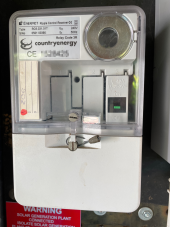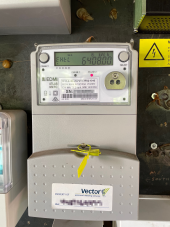On one of Andy's early videos (off grid garage) I believe he comments on his home has three phase, but one phase is set for critical loads, to enable the utility to quickly shead loads (when required) while maintaining some power supply to each home to run things like fridges and freezers (medical devices come to mind), I wondered if you can comment. Is this a 'thing' in Australia?
His supply is a little unusual in that I believe he has two phases of a 3-phase supply connected to power the house. Normally a home with 3-phase supply would have all three phases connected to the home's regular anytime supply (enabling 3-phase appliances to be connected - things like large ducted aircon systems, in-floor slab heating systems, or 3-phase EV chargers).
Most homes here have single phase supply. I have 3-phase supply and my grid-tied PV system is 3-phase.
His other phase is dedicated to a controlled load, namely his water heater (and perhaps previously also his pool pump which he now runs off-grid).
The timing of the power supplied to controlled loads is managed by the utility. In his State of QLD (and mine, NSW) it is common for ripple control devices in main circuit boards to control a relay so that power supply to these designated loads is not available during peak demand periods.
The utility sends a high frequency signal over the grid and these devices respond to that signal. Here they are referred to a "controlled loads" or "dedicated circuits". Such devices/appliances must be hardwired - a controlled load is not permitted to be used for regular power outlets - those must only be connected to the regular anytime supply.
This is a pic of my ripple control device:

Andy will have something similar, although some older controlled loads use a mechanical timer controlled device.
There are usually a couple of options for having a controlled load. One enables power supply for about 15-18 hours/day, the other for 6-9 hours/day, and consumption by these controlled loads is charged at lower off-peak tariff rates. Suitable for things like water heaters, pool pumps, slab heating. I have one such circuit and a dedicated utility meter for it (my regular supply has a separate 3-phase meter):

But given my water heater now draws almost all of its energy from my grid-tied PV via a smart diverter, I am rarely drawing energy via that controlled load. That register reading of 6408 kWh has not moved since October. I use this to divert my PV energy instead:

So yes, in the scenario where these controlled loads are on, and the grid needs to rapidly shed load (like what happened
when the Callide B coal power station in QLD exploded) then the grid operators can send the signal out to turn off these loads. In that particular case it either wasn't fast enough or sufficient to prevent grid outage / load shedding across regions of the state.
Larger aircon systems here also have the ability to be controlled via DRED, whereby the unit can be instructed to operate at either 0% power (i.e. off), 50% power, 75% power or normal operation. While DRED capability is a standard requirement of aircon systems, DRED control by grid operators has never really taken hold here.
My ducted AC does have this capability, and I am contemplating using it myself as I would like to reduce how much power it consumes at certain times (especially at night).






